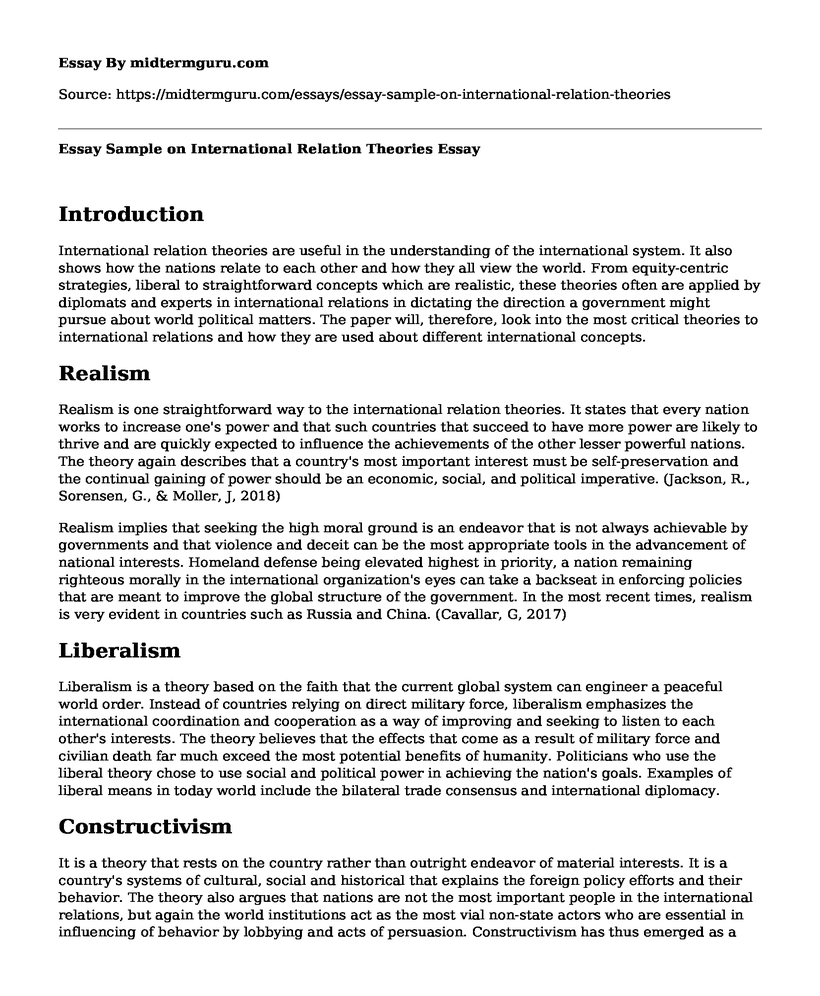Introduction
International relation theories are useful in the understanding of the international system. It also shows how the nations relate to each other and how they all view the world. From equity-centric strategies, liberal to straightforward concepts which are realistic, these theories often are applied by diplomats and experts in international relations in dictating the direction a government might pursue about world political matters. The paper will, therefore, look into the most critical theories to international relations and how they are used about different international concepts.
Realism
Realism is one straightforward way to the international relation theories. It states that every nation works to increase one's power and that such countries that succeed to have more power are likely to thrive and are quickly expected to influence the achievements of the other lesser powerful nations. The theory again describes that a country's most important interest must be self-preservation and the continual gaining of power should be an economic, social, and political imperative. (Jackson, R., Sorensen, G., & Moller, J, 2018)
Realism implies that seeking the high moral ground is an endeavor that is not always achievable by governments and that violence and deceit can be the most appropriate tools in the advancement of national interests. Homeland defense being elevated highest in priority, a nation remaining righteous morally in the international organization's eyes can take a backseat in enforcing policies that are meant to improve the global structure of the government. In the most recent times, realism is very evident in countries such as Russia and China. (Cavallar, G, 2017)
Liberalism
Liberalism is a theory based on the faith that the current global system can engineer a peaceful world order. Instead of countries relying on direct military force, liberalism emphasizes the international coordination and cooperation as a way of improving and seeking to listen to each other's interests. The theory believes that the effects that come as a result of military force and civilian death far much exceed the most potential benefits of humanity. Politicians who use the liberal theory chose to use social and political power in achieving the nation's goals. Examples of liberal means in today world include the bilateral trade consensus and international diplomacy.
Constructivism
It is a theory that rests on the country rather than outright endeavor of material interests. It is a country's systems of cultural, social and historical that explains the foreign policy efforts and their behavior. The theory also argues that nations are not the most important people in the international relations, but again the world institutions act as the most vial non-state actors who are essential in influencing of behavior by lobbying and acts of persuasion. Constructivism has thus emerged as a powerful entity, for instance, the Amnesty International, and Greenpeace which have gained considerable influence in the world.
Marxism
Karl Marx, a Russian economist, and philosopher came with a theory that societies in the world can avoid self-destructive nature of systems such as capitalist socioeconomic systems through implementation of the socialist method into their policies, both abroad and locally. The approach keenly analyses social classes and aims to destroy the structure of capitalism since capitalism is no longer applicable in the modern world. The theory seeks to societies working together to the benefit of the entire organization rather than looking at profiting individuals. Under his approach, nations would work to ensure that corporations and communities get the basic human needs instead of private cooperation working for their profits.
Conclusion
International theories are systems that were implemented mainly to bring change and a new phase to uphold humanity and the sense of living together as one community. The arguments were initiated mostly to prevent the use of forceful means towards citizens, and that peaceful means of power and economic status should be the means to be used.
References
Baylis, J., Smith, S., & Owens, P. (Eds.). (2017). The globalization of world politics: an introduction to international relations. Oxford University Press.
Cavallar, G. (2017). The rights of strangers: Theories of international hospitality, the global community and political justice since Vitoria. Routledge.
Jackson, R., Sorensen, G., & Moller, J. (2019). Introduction to international relations: theories and approaches. Oxford University Press, USA.
Cite this page
Essay Sample on International Relation Theories. (2022, Nov 03). Retrieved from https://midtermguru.com/essays/essay-sample-on-international-relation-theories
If you are the original author of this essay and no longer wish to have it published on the midtermguru.com website, please click below to request its removal:
- Essay on Effects of Trumps Election
- Essay on Police as Public Servants
- Commercialization and Privatization of Airports - Essay Example
- Essay Sample on Low Fertility in Japan
- Paper Example on Housing Market in the UK
- Trump Immigration Ban - Essay Sample
- Albert Einstein: Economics Innovator & Explainer of Socialism - Essay Sample







